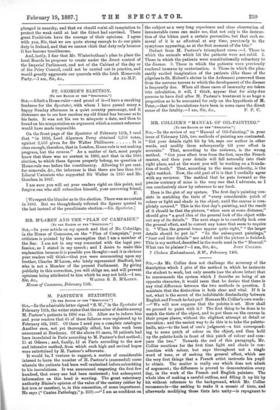M. PASTEUR'S STATISTICS.
(To TEE EDITOR OF THE SPECTATOR.") SI14—In the admirable letter signed "S. W.," in the Spectator of February 12th, the writer states that the number of deaths among If. Pasteur's patients in 1886 was 53. Allow me to inform him and your readers that 65 of these failures were registered up to February 4th, 1887. Of these I send you a complete catalogue. Another case, not yet thoroughly sifted, has this week been announced at Bordeaux. Of the above 65 cases, 38 patients had been inoculated in Paris according to M. Pasteur's first method ; 15 at Odessa ; and, finally, 12 at Paris according to the new and intensive method, from which such high and revived hopes were entertained by M. Pasteur's adherents.
It would be, I venture to suggest, a matter of considerable interest to learn the number of M. Pasteur's (successful) cures wherein the patients had been well cauterised before submitting to his inoculations. It was announced respecting the first few hundred, that every one had been cauterised ; but subsequent information on this head is wanting. The great veterinary authority Blaine's opinion of the value of the cautery (either by hot iron or caustics), is, in this connection, of some importance.
He says (" Canine Pathology," p. 250) I am as confident on the subject as a very long experience and close observation of innumerable cures can make me, that not only is the destruc- tion of the bitten part a certain preventive, but that such re- moval of it is as effectual at any time, previously to the symptoms appearing, as at the first moment of the bite."
Deduct from M. Pasteur's triumphant cares Those in which the animals which bit the patients were not rabid. 2. Those in which the patients were constitutionally refractory to the disease. 3. Those in which the patients were previously rendered immune by cauterisation. 4. Those in which the plea- santly excited imagination of the patients (like those of the pilgrims to St. Hubert's shrine in the Ardennes) preserved them from the nervous terrors to which the development of the disease is frequently due. When all these cases of immunity are taken into calculation, it will, I think, appear that for sixty-five persons to have died after M. Pasteur's treatment is so huge a proportion as to be accounted for only on the hypothesis of M. Peter,—that the inoculations have been in some cases the direct cause of the fatality.—I am, Sir, &c., F. P. C.


































 Previous page
Previous page